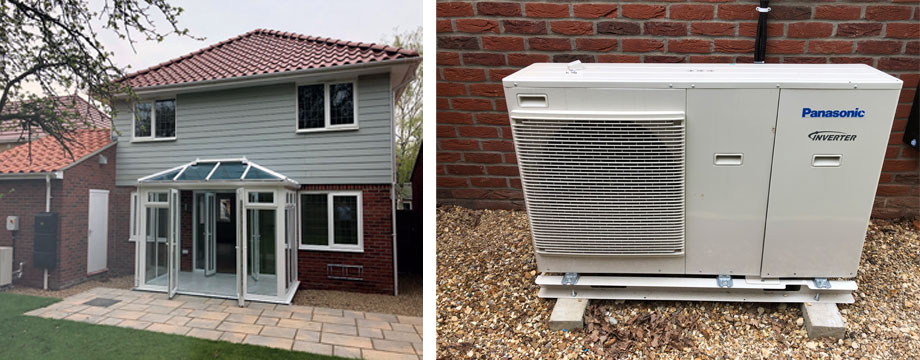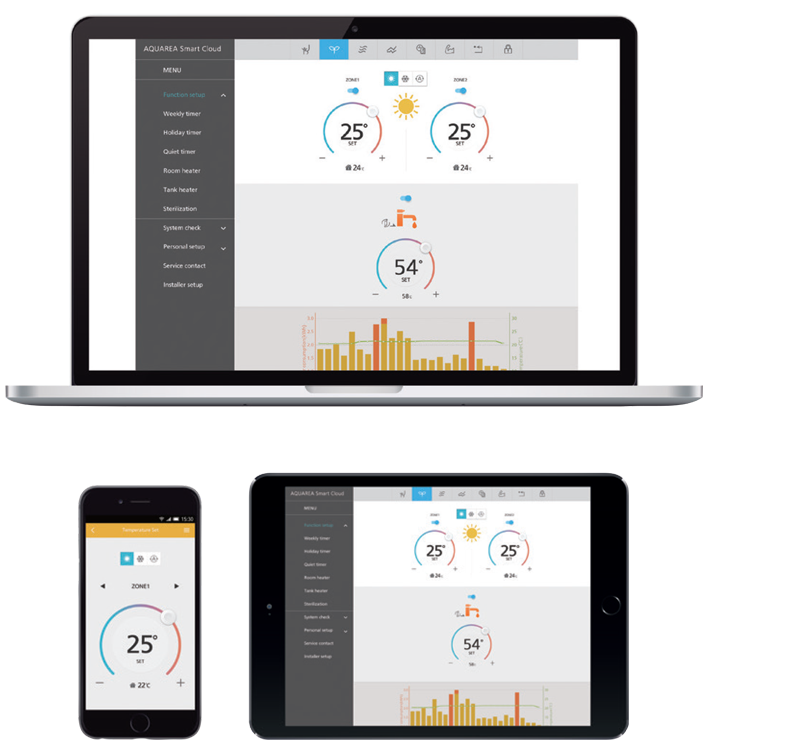 Decarbonisation is high on the agenda for current housing developments to lower carbon emissions from homes, with the average eco-home capable of cutting energy bills by 30%[1]. Now is the time to act and start changing the way we heat and cool our homes. Richard Bishop, Head of Marketing for UK and Ireland for Panasonic, puts forward the significant role that heat pumps can play to help reduce emissions, energy consumption and lowering costs.
Decarbonisation is high on the agenda for current housing developments to lower carbon emissions from homes, with the average eco-home capable of cutting energy bills by 30%[1]. Now is the time to act and start changing the way we heat and cool our homes. Richard Bishop, Head of Marketing for UK and Ireland for Panasonic, puts forward the significant role that heat pumps can play to help reduce emissions, energy consumption and lowering costs.
Air source heat pumps currently on the market are very reliable, are quiet in operation and highly energy efficient when compared to oil-fired boilers or electric heaters and can be play a large part in lowering carbon emissions. Further efficiencies can be achieved when linked to smart controllers to produce significant savings for heating and domestic hot water (DHW) provision.
Manufacturers are currently increasing their offering of sustainable energy solutions designed for residential applications. An example is the Panasonic Aquarea air-to-water heat pump range, which has one of the widest ranges on the market, with options to suit most sizes of property and output requirements. These heat pumps, together with smart remote control such as the Smart Cloud and Service Cloud, monitoring, fault diagnosis and fault rectification technology provide a comprehensive and energy efficient solution for heating and domestic hot water provision.
Panasonic has long since been pioneers for creating energy efficient heating and cooling units, and one of its key motivators when developing latest innovations is its Environmental Vision 2050, to ensure a positive contribution to society by reducing the amount of energy used and utilising clean energy.
Panasonic’s air-to-water heat pump range, Aquarea, is an innovative low-energy system that uses the lower GWP refrigerant (R32) and provides heating and hot water, even when outdoor temperatures are extremely low. With many sizes, capacities and options to choose from, the Aquarea Range offers a very wide choice to ensure the most appropriate system for all sizes of properties and comes in three different versions: Monobloc, Bi-Bloc and All-in-One.

According to independent tests, the Panasonic Aquarea J Generation R32 Mini Monobloc range and 16kW Bi-Bloc T-Cap Super Quiet air-to water heat pumps have been confirmed to have impressively low levels of noise when in operation with independent tests confirming market leading noise levels of 60dB(A)1 whilst operating at full load.
Marina Village Greystones in Ireland features 358 architecturally designed A-rated homes. All homes were installed with the Panasonic Monobloc Aquarea air to water heat pump because of their outstanding A++ energy efficiency rating. This project is more than just environmentally friendly, it’s consistently saving residents up to 50% on their fuel bills, 20% more than the average eco-friendly home is predicted to do.[2]
The air-to-water heat pump units from Panasonic have also recently been certified as Passive House Components by the respected Passive House Institute (PHI) thanks to its high-performance capabilities, exceptional comfort, and low energy costs. The innovative Aquarea technology converts heat energy in the air into household warmth, reducing CO2 emissions and environmental impact compared to conventional boilers and electric heaters. Panasonic is one of the very few manufacturers to produce 3 kW heat pump models, which is what most Passive House buildings use as it allows for energy savings and high efficiency.
Heat pumps can be connected to existing radiators, underfloor and fan assisted radiators to deliver heating in the winter, plus dedicated cooling can be provided during the summer if required from the units.
Aquarea A2W heat pumps are proving popular with developers looking to provide highly efficient heating and hot water, whilst also providing homeowners with a reliable system offering long-term energy savings. Ivor Farnworth, Managing Director of Primrose Developments commented: “We recently looked into several systems but found the Panasonic Aquarea T-Cap heat pumps to be very quiet compared to competitors, aesthetically pleasing and have been impressed with the performance of the product.”
 Smart Controls
Smart Controls
Smart solutions such as the Panasonic Smart Cloud and Service Cloud can now remotely monitor the suction and discharge pressure of a unit to help reduce system down time, thus ensuring that they have a heating, cooling and hot water system that suits their individual daily needs.
The Panasonic Smart Cloud and Panasonic Service Cloud has been introduced to the industry to enable direct communication between heat pump units and controllers. This integration allows building owners and portfolio managers to view all their heating and cooling units anytime and from anywhere via a single interface and via mobile devices such as tablet, mobile or laptop, plus delivers actionable real time insights to help reduce energy consumption and drive savings.
The Panasonic Smart Cloud enable users to manage and monitor their heating, cooling and hot water with an easy-to-use interface that can be accessed via any web-enabled device, including Android and iOS applications and Internet browsers. Users can easily adjust the temperature for multiple units on multiple sites. This enables users to eliminate unnecessary heating for example, when a property is unoccupied and therefore reduce energy consumption. Additionally, it is possible to change the temperature of the hot water supplied by their system from their Aquarea Smart Cloud app.
Using this smart technology, users can access a detailed breakdown of the system’s energy consumption from 60 minutes to 7 days and schedule the settings to ensure a constant and comfortable temperature throughout. This can help end users compare space utilisation and adjust the system so that energy is not wasted. It is crucial for installers to draw attention to this added value that a smart control system can offer these incredible benefits from the IoT revolution.
Remote Maintenance
With the Panasonic Service Cloud, remote access enables installers to offer ongoing maintenance contracts to their customers from a remote location and 24/7 and from a smart device such as a mobile, tablet or laptop. Maintenance teams can be engaged in predictive fine-tuning which keeps the heating, cooling and hot water system operating at its optimum level for longer. This minimises the likelihood of a system break-down by anticipating maintenance and means a longer lifespan for the units. Installers can respond more quickly to faults and issues, keeping the end user completely satisfied with their heating systems.
By providing useful data over the web to remote PCs, tablets and smartphones such as the Panasonic Aquarea Service Cloud, it is now possible to access and collate data from heating and cooling systems remotely. This data can be stored in the cloud and made readily available for collation and analysis to improve energy management. The increased accessibility of the system can improve maintenance and repair regimes, as well as helping end-users reduce their costs and energy consumption.
Experienced Heat Pump Installer, Peter Wickens, MD of Fuel Effect commented, “The Panasonic Aquarea Service Cloud system has been a huge revelation to the industry, I know a customer has a problem before they do - the system can identify any malfunctions and notify me to rectify, before it becomes an issue for the occupant of the property. The system helps us provide our customers with exceptional support and customer service. I can gain more information from the remote Aquarea smart cloud system than I can standing in front of the unit itself.”
In conclusion, the average household in the UK emits 2.7 tonnes of CO2 every year[3] from heating alone. Switching to air to water heat pumps to provide heating to our homes such as the Panasonic Aquarea J Generation with R32 refrigerants, housing emissions can be lowered significantly, plus residents can save up to 50% on their fuel bills. Air to water heat pumps is the future for the housing sector and an essential step in challenging the climate change problem.
For more information on the Panasonic range of low carbon solutions, please visit the website
[1] https://www.openaccessgovernment.org/the-rise-of-britains-sustainable-homes-building-eco-friendly-on-a-budget/43544/
[2] https://www.aircon.panasonic.eu/GB_en/cases/case/50-energy-savings-achieved-with-new-panasonic-air-source-heat-pump/
[3] https://citu.co.uk/citu-live/what-is-the-carbon-footprint-of-a-house/
- Log in to post comments














